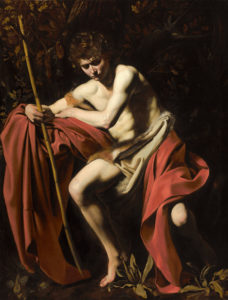Thoughts on Sunday’s Lessons for Dec. 10, 2017

Saint John the Baptist in the Wilderness (1604-05). Oil painting by Michelangelo Merisi da Caravaggio (1571–1610); Nelson-Atkins Museum of Art, Kansas City. (Click image to enlarge.)
The Messiah is coming! Get ready! The Messiah is coming! Make the way clear! Imagined in modern language, Sunday’s readings might be shouting “Roll out the red carpet!” as we move into the second week of Advent. Our Isaiah reading – which may sound familiar, as Handel drew from it freely in his beloved “Messiah” – sings out comfort and hope to the people in exile. Jerusalem has paid doubly for her sins. Life is short as grass and flowers, but God’s word stands forever. Prepare the way! Make a straight highway in the desert, the prophet calls. Then we see a poetic image of a gentle, maternal Messiah who holds the lambs closely and gently leads the mother sheep.
Psalm: Psalm 85:1-2, 8-13
Sunday’s Psalm, particularly as edited to skip over a few verses of wistful doubt, shares the joyful hope of the Isaiah reading. The Psalmist remembers the people’s time time in exile, and rejoices that God did, indeed, come to the people with comfort and peace. Even though the people had been sinful and broken their covenant with God, God forgave their iniquity and blotted out all their sins. The straight highway that was built at Isaiah’s command has become a path for God’s feet.
Second Reading: 2 Peter 3:8-15a
This letter written in Peter’s name is the latest document in the New Testament, written down 100 years or more after the crucifixion. After such a long time, people worried: Why hadn’t Christ come back yet? He had been expected to return in power and glory, but that didn’t happen. What did this mean? The author had an idea, one that we also hear in the Isaiah verses: God’s time is not like our time. “One day is like a thousand years, and a thousand years like one day.” Be patient and live godly lives, while God waits patiently for all to come to repentance before the day of the Lord comes.
Gospel: Mark 1:1-8
Mark’s Gospel, the first written in the New Testament, perhaps only 30 or 40 years after Jesus died on the cross, does not say a word about Jesus’ birth but begins with Jesus as an adult, coming to John at the Jordan river to be baptized for repentance and forgiveness of sins. Mark first shows us John the Baptist, a wild man eating locusts and honey and wearing camel’s hair, shouting Isaiah’s promise that God would send a messenger to prepare the Messiah’s way. Jesus is coming after him, John foretells: The one so powerful that John is not worthy to stoop down and untie his sandals is coming to baptize us with the Holy Spirit!
